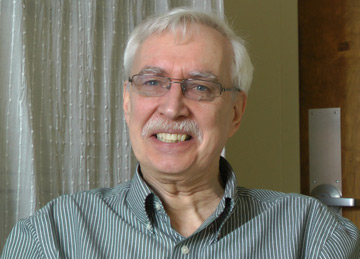Marc

Cares for his friend
Age at interview: 62
Age at start of caregiving: 32
Marc (62 years old) is married and lives with his wife and a friend for whom he provides care. Marc’s friend was born with cerebral motor deficiency, a dysarthria, and a quadriplegia. While aging he has also developed a dysphagia and, since 12 years, he has developed a very slow form of cancer. Marc has been providing 24/7 care to his friend for the past 30 years (beginning at age 32). Thanks to a governmental programme his friend pays him for five to six hours of professional care per day.
Marc had a university degree and a temporary paid job. He felt strongly, however, that he needed some greater direction or meaning to his life. This is when he met an elderly couple looking for help to care for their quadriplegic adult son. The couple was looking for somebody that could take over his physical care, as well as his outings. As soon as Marc met them he agreed to do this work. He moved in with them. In no time, what started as a paid job grew into a very close friendship.
For six years he shared the room with his friend. After that, they moved together to an apartment in the neighbourhood. There, he fell in love with a woman who worked as an auxiliary for the neighbours. She moved in with Marc and his friend and they lived together for one year before they moved to an apartment where there would be sufficient space for the three of them. 30 years later, Marc still cares for his friend. His wife has her own work and is not involved in the care.
During all the years of caregiving, Marc states that his friend has been a major source of inspiration for him. He feels proud to be his friend and caregiver. Marc describes his friend as an audacious person who does not stop realizing his dreams and making things happen. Together they have been able to complete many interesting projects. For instance, the construction of four apartments for physically handicapped people, an autobiography written by his friend, “Des yeux pour le dire”, as well as presentations and conferences given at regional, national and international levels. Marc’s friend is mute, and speaks with his eyes. Healthcare services are not adapted to this form of communication. This has resulted in stressful times for both of them during his friend’s hospitalizations.
For Marc the caregiving is like a journey without end. He is learning to adapt and change, but it has not always been easy. Having lived through two periods of depression in previous winters, Marc feels that he has now found a certain serenity or wisdom. He developed the ability to sit down and let all tension go before continuing the day. Marc has also made changes in his own daily routine in tune with his caregiving identity, such as volunteering in a caregiver’s organisation and in a local “centre communautaire de loisirs”.
More content
- Travelling, holidays and respite – MarcMarc and the friend he cares for love to travel. Travelling helps them get through more difficult moments.
- Navigating the system – MarcIt can be “hit or miss”; sometimes Marc knocks on the right door, and other times the wrong door.
- Resources – MarcYou don’t always know where to ask for help. It would be easier if there were one single place to turn for good information, says Marc.
- Effects of care recipients’ behaviour – MarcMarc is very touched and inspired by the friend for whom he is caring.
- Trying to find the right balance – MarcMarc gives a lot of time to care for his friend, but also needs time for himself. He has learned to reconnect with himself during his free moments.
- Caring for yourself – MarcIn his experience, Marc was confronted with an existential dimension to caregiving: “Caring for someone is also suffering; it is suffering through love.”
- Financial impact – MarcMarc makes little money as a caregiver, but he is not worried. This is a choice he has made.
- Impact on health – MarcMarc lived through two periods of depression, but feels that now he has found a better equilibrium.
- The future and caregiving – MarcMarc doesn’t know what the future will bring but believes "where there is a will, there is a way."
- Providing support – MarcMarc’s friend is only able to speak with his eyes. Marc describes how this made his hospital stay more complicated.